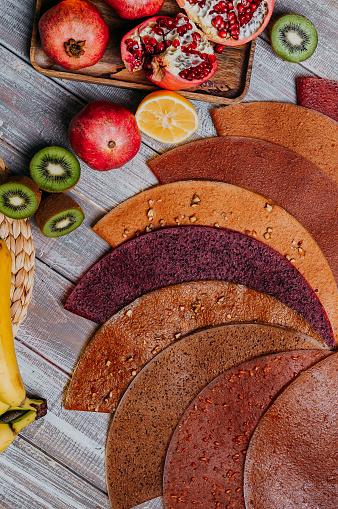From vegan 3D printed steak to sneakers made from pineapple ‘leather,’ vegan innovations are a cash cow
For decades the interiors of posh cars have been decked with only the best leather. Any handbag from a luxury fashion house was once sure to be made of only the finest tanned hides. But animal products of all kinds are so 20th century. Porsche now offers a vegan microfiber interior option that the company says produces 80% less C02 than the leather version. What’s more, recycled fishing nets – such nets account for roughly 50% of the plastic floating around our oceans – are used to build the floor of the ‘vegan’ Porsche Taycan. The autumn/winter 2021 Hermès fashion collection from luxury fashion house Birkin and Kelly showcased the Victoria leather lookalike ‘Sylvania’ bag. Prices for the original classic leather version of the bag start around US$4,500, but it wasn’t any price tag that shook up the fashion world when the new option was released. Their new bag isn’t made from some fancy plastic imitation leather, it’s made from a type of fungus. Known as bio textiles, Hermès is using just one of a whole host of natural substitutions for animal products being used in everything from fashion to, obviously, food. As The Guardian newspaper reports, organic substances being used to create leather and plastic replacements include apples, cactus, grapes, pineapples mushrooms, and other vegan alternatives. Veganism has been reborn. Once niche market whose consumers were often ridiculed, non-animal products are now “cool,” and found in high fashion, luxury cars… and, naturally, dinner options. The latter of which is perhaps the most interesting for the average consumer.
The alternative meat industry is already worth tens of billions of dollars and is set for incredible growth over the next decade, possibly hitting US$200 billion in 2035 by some estimates. And this is a market that’s moved way beyond the standards of Beyond Meat or the Impossible Burger set roughly a decade ago. Those options are nice but are approximations of meat in only loose terms. Sure, they kind of really taste like meat and sure do sort of have the texture of animal flesh, but you’re not going to fool anyone. But that’s not the case with these latest iterations. High-tech startups based everywhere from the United States to Israel, and Israel punches above its weight in this and pretty much every startup arena, are producing vegan meat that is making even diehard meat lovers, barbecue experts, and celebrity chefs say that they’d switch over. We’re talking about a vegan kebab, for example, that is essentially indistinguishable from the real deal. Some may scoff, but just wait until you get your first taste. The breakthrough has become possible due to new technologies that harness AI, taste experts, and surprisingly – 3D printing. Layers of this faux meat are printed with a 3D printer, and each layer provides a different flavor and texture – ‘alt fat’ and ‘alt-muscle’ – with the result getting rave reviews. Just take a look at some pictures of vegan steak by Israeli startup Redefine Meat, and you’ll wonder if your eyes are tricking you.
Consumers of all stripes are beginning to take sustainability seriously, an idea that in all honesty was previously just paid lip service to by corporations. Once, the rejection of animal products was an avant-garde position held by militant environmentalists. In 2022, however, be on the lookout for a tectonic shift in both consumer demand and business offerings. The meat industry is hands-down unsustainable, and its long-term viability is barely worth debating. Cattle ranching is the largest driver of deforestation in the Amazon and alongside meat, cattle also provide leather. And it’s not just that leather has to come from cows, even in modern tanneries the toxic chemicals used for producing leather are horrifically polluting and there really isn’t any other way to make it. One ton of leather hide may require as much as 80 cubic meters of polluted wastewater. One pound of boneless beef might require over 400 gallons of water to produce – and that’s a huge improvement from a few decades ago, when that number may have hit 1000 or more. These glaring facts are becoming too much for intelligent, informed consumers to accept and businesses are seeing opportunity in innovating away from toxic unsustainability and towards a vegan future that could include almost everything. Nike has trainers made out of pineapple leather, yes… ‘leather’ made out of pineapple. The new Nike range of shoes look just as good as any leather ones and the products are said to be made with 95% renewable materials and also, as it is sourced from the Philippines, provides Filipino farmers with a new, highly-needed revenue stream.
The vegan future is exciting, and not just for vegans. Innovators are proving that none of our previous desires need to be sublimated. You can still have the taste of lamb or beef, you can still have the feel of leather, you can still have spandex-like clothing… but made from cactus. Put simply: if your company isn’t thinking about how to innovate towards sustainability, your company soon likely itself won’t be sustainable.



